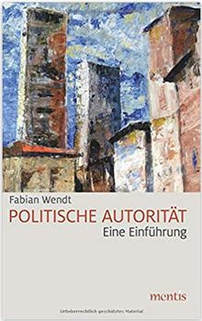
Politische Autorität: Eine Einführung
Münster: Mentis, 2018
Link Download draft of first chapter (PDF)
This is the German translation of Authority. It was reviewed at Deutschlandfunk, Zeitschrift für philosophische Forschung (Band 73, Heft 3, 2019), and Aufklärung und Kritik (2/2019).
Staaten beanspruchen für sich das Recht, Gesetze geben und mit Zwangsgewalt durchsetzen zu dürfen. Doch unter welchen Bedingungen haben sie dieses Recht tatsächlich? Das ist die grundlegendste Frage der Politischen Philosophie. Obwohl wir die Autoritätsansprüche des Staates oft als selbstverständlich hinnehmen, erscheinen sie moralisch durchaus fragwürdig, wenn man Personen als Freie und Gleiche begreift. Wie können wenige Parlamentsmitglieder das Recht haben, für Millionen Menschen verbindliche Gesetze zu erlassen? Wie können Polizeibeamte und Richter das Recht haben, diese Gesetze gegenüber Personen durchzusetzen, die sie ablehnen? In diesem kurzen, verständlichen und anregenden Buch stellt Fabian Wendt die fünf wichtigsten Theorien politischer Autorität aus der zeitgenössischen Politischen Philosophie vor. Er diskutiert darüber hinaus den Anarchismus, der als Alternative ernst zu nehmen ist, falls alle Begründungsversuche politischer Autorität fehlschlagen sollten.
Münster: Mentis, 2018
Link Download draft of first chapter (PDF)
This is the German translation of Authority. It was reviewed at Deutschlandfunk, Zeitschrift für philosophische Forschung (Band 73, Heft 3, 2019), and Aufklärung und Kritik (2/2019).
Staaten beanspruchen für sich das Recht, Gesetze geben und mit Zwangsgewalt durchsetzen zu dürfen. Doch unter welchen Bedingungen haben sie dieses Recht tatsächlich? Das ist die grundlegendste Frage der Politischen Philosophie. Obwohl wir die Autoritätsansprüche des Staates oft als selbstverständlich hinnehmen, erscheinen sie moralisch durchaus fragwürdig, wenn man Personen als Freie und Gleiche begreift. Wie können wenige Parlamentsmitglieder das Recht haben, für Millionen Menschen verbindliche Gesetze zu erlassen? Wie können Polizeibeamte und Richter das Recht haben, diese Gesetze gegenüber Personen durchzusetzen, die sie ablehnen? In diesem kurzen, verständlichen und anregenden Buch stellt Fabian Wendt die fünf wichtigsten Theorien politischer Autorität aus der zeitgenössischen Politischen Philosophie vor. Er diskutiert darüber hinaus den Anarchismus, der als Alternative ernst zu nehmen ist, falls alle Begründungsversuche politischer Autorität fehlschlagen sollten.
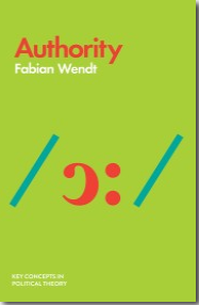
Authority
Cambridge: Polity Press (Key Concepts in Political Theory), 2018
Link Download draft of first chapter (PDF)
From citizens paying taxes to employees following their bosses’ orders and kids obeying their parents, we take it for granted that a whole range of authorities have the power to impose duties on others. However, although authority is often accepted in practice, it looks philosophically problematic if we conceive persons as free and as equals. In this short and accessible book, Fabian Wendt examines the basis of authority, discussing five prominent theories that try to explain how claims to authority can be vindicated. Focusing in particular on the issue of how states can rightfully claim authority, he rigorously analyses the theories’ arguments and evaluates their strengths and weaknesses. He also debates anarchism as an alternative that should be taken seriously if no theory ultimately succeeds in explaining state authority. This clear and engaging book will be essential reading for anyone grappling with the most fundamental questions of authority and obligation in political theory and political philosophy.
“Fabian Wendt has produced an elegant overview of recent discussions of both political and theoretical authority. Clear, thorough, and consistently insightful.”
(George Klosko, University of Virginia)
“Fabian Wendt’s fresh, penetrating analysis of the problems of political obligation and political authority is unsurpassed. Current approaches to this perennial topic and the future directions open to theorists are clarified with surgical precision. This book is both an accessible introduction for all and essential reading for specialists.”
(William A. Edmundson, Georgia State University)
Cambridge: Polity Press (Key Concepts in Political Theory), 2018
Link Download draft of first chapter (PDF)
From citizens paying taxes to employees following their bosses’ orders and kids obeying their parents, we take it for granted that a whole range of authorities have the power to impose duties on others. However, although authority is often accepted in practice, it looks philosophically problematic if we conceive persons as free and as equals. In this short and accessible book, Fabian Wendt examines the basis of authority, discussing five prominent theories that try to explain how claims to authority can be vindicated. Focusing in particular on the issue of how states can rightfully claim authority, he rigorously analyses the theories’ arguments and evaluates their strengths and weaknesses. He also debates anarchism as an alternative that should be taken seriously if no theory ultimately succeeds in explaining state authority. This clear and engaging book will be essential reading for anyone grappling with the most fundamental questions of authority and obligation in political theory and political philosophy.
“Fabian Wendt has produced an elegant overview of recent discussions of both political and theoretical authority. Clear, thorough, and consistently insightful.”
(George Klosko, University of Virginia)
“Fabian Wendt’s fresh, penetrating analysis of the problems of political obligation and political authority is unsurpassed. Current approaches to this perennial topic and the future directions open to theorists are clarified with surgical precision. This book is both an accessible introduction for all and essential reading for specialists.”
(William A. Edmundson, Georgia State University)
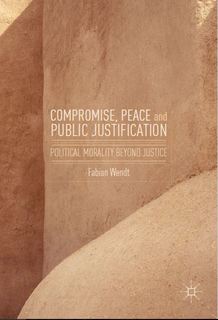
Compromise, Peace and Public Justification:
Political Morality Beyond Justice
London: Palgrave Macmillan, 2016
Link Download draft of TOC and introduction (PDF)
Reviewed in Ethics. The book is based on my Habilitation thesis, which was submitted at the University of Hamburg in 2015.
This book explores the morality of compromising. The author argues that peace and public justification are values that provide moral reasons to make compromises in politics, including compromises that establish unjust laws or institutions. He explains how it is possible to have moral reasons to agree to moral compromises and he debates our moral duties and obligations in making such compromises. The book also contains discussions of the sources of the value of public justification, the relation between peace and justice, the nature of modus vivendi arrangements and the connections between compromise, liberal institutions and legitimacy. In exploring the morality of compromising, the book thus provides some outlines for a map of political morality beyond justice.
"This bold and persuasive book takes the moral dimension of political conflict seriously and grounds Modus Vivendi politics on a deeper account of the morality of compromise. This is a real achievement, one that significantly advances our understanding of peace, public justification and the limits of justice."
(Steven Wall, University of Arizona)
"In this important new book, Fabian Wendt explores some neglected features of ‘political morality beyond justice’; and in particular the role of peace and public justification in the grounding of political compromises. In doing so, he develops a sophisticated theoretical account of political compromises, and convincingly shows how and why compromising with justice is sometimes justified. The book is essential reading for anyone interested in the political morality of compromising."
(John Horton, Keele University)
"Fabian Wendt's book is a timely and important contribution to the debates about morally rifted societies. Whereas many of the main theories in the literature embrace highly moralized conceptions of virtues such as toleration and regard consensus as an appropriate ideal of social and political debate, Wendt presents a bracing alternative that emphasizes the importance of peace and the need for compromise."
(Daniel Weinstock, McGill University)
Political Morality Beyond Justice
London: Palgrave Macmillan, 2016
Link Download draft of TOC and introduction (PDF)
Reviewed in Ethics. The book is based on my Habilitation thesis, which was submitted at the University of Hamburg in 2015.
This book explores the morality of compromising. The author argues that peace and public justification are values that provide moral reasons to make compromises in politics, including compromises that establish unjust laws or institutions. He explains how it is possible to have moral reasons to agree to moral compromises and he debates our moral duties and obligations in making such compromises. The book also contains discussions of the sources of the value of public justification, the relation between peace and justice, the nature of modus vivendi arrangements and the connections between compromise, liberal institutions and legitimacy. In exploring the morality of compromising, the book thus provides some outlines for a map of political morality beyond justice.
"This bold and persuasive book takes the moral dimension of political conflict seriously and grounds Modus Vivendi politics on a deeper account of the morality of compromise. This is a real achievement, one that significantly advances our understanding of peace, public justification and the limits of justice."
(Steven Wall, University of Arizona)
"In this important new book, Fabian Wendt explores some neglected features of ‘political morality beyond justice’; and in particular the role of peace and public justification in the grounding of political compromises. In doing so, he develops a sophisticated theoretical account of political compromises, and convincingly shows how and why compromising with justice is sometimes justified. The book is essential reading for anyone interested in the political morality of compromising."
(John Horton, Keele University)
"Fabian Wendt's book is a timely and important contribution to the debates about morally rifted societies. Whereas many of the main theories in the literature embrace highly moralized conceptions of virtues such as toleration and regard consensus as an appropriate ideal of social and political debate, Wendt presents a bracing alternative that emphasizes the importance of peace and the need for compromise."
(Daniel Weinstock, McGill University)
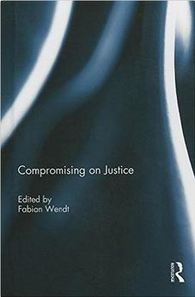
Compromising on Justice (ed.)
London: Routledge, 2014
Link Download draft of TOC and introduction (PDF)
This book was previously published as a special issue of the Critical Review of Social and Political Philosophy (Vol. 16, No. 4, 2013, Link). It contains articles by Sune Lægaard, Enzo Rossi, Robert B. Talisse, Steven Wall, Daniel Weinstock, and Fabian Wendt.
When we compromise on justice, we accept or acquiesce to an arrangement that we judge to be unjust, or at least not fully just. Such arrangements are often described as constituting a ‘modus vivendi’. What reasons could we have to accept a modus vivendi, thereby compromising on justice? Given the fact of disagreement on justice, this is an important, but rather neglected question in political philosophy. One possible answer, inspired by John Rawls, is that compromising on justice is only justified if this nonetheless brings us as close to ideal justice as possible under given circumstances. The most straightforward way to take issue with this answer is to present other reasons to compromise on justice. The articles in this book explore epistemic reasons and those that stem from values besides justice, like democracy, peace, toleration and non-subjugation. This book thereby sheds some light on the relevance of compromising for the legitimacy of institutional arrangements.
London: Routledge, 2014
Link Download draft of TOC and introduction (PDF)
This book was previously published as a special issue of the Critical Review of Social and Political Philosophy (Vol. 16, No. 4, 2013, Link). It contains articles by Sune Lægaard, Enzo Rossi, Robert B. Talisse, Steven Wall, Daniel Weinstock, and Fabian Wendt.
When we compromise on justice, we accept or acquiesce to an arrangement that we judge to be unjust, or at least not fully just. Such arrangements are often described as constituting a ‘modus vivendi’. What reasons could we have to accept a modus vivendi, thereby compromising on justice? Given the fact of disagreement on justice, this is an important, but rather neglected question in political philosophy. One possible answer, inspired by John Rawls, is that compromising on justice is only justified if this nonetheless brings us as close to ideal justice as possible under given circumstances. The most straightforward way to take issue with this answer is to present other reasons to compromise on justice. The articles in this book explore epistemic reasons and those that stem from values besides justice, like democracy, peace, toleration and non-subjugation. This book thereby sheds some light on the relevance of compromising for the legitimacy of institutional arrangements.
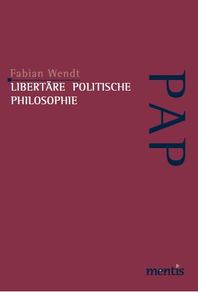
Libertäre politische Philosophie
Paderborn: Mentis, 2009
Link Download draft of TOC and first chapter (PDF)
The book is based on my Ph.D. thesis, which was submitted at the Ludwig Maximilian University of Munich in 2008. It was reviewed in Neue Zürcher Zeitung, Philosophisches Jahrbuch, Aufklärung und Kritik, eigentümlich frei, and Analytica.
Libertäre politische Philosophie ist ihrem Selbstverständnis nach freiheitsradikal. Abgesehen von einem Minimalstaat, der das Leben und Eigentum seiner Bürger schützt, soll in allen Bereichen der Gesellschaft laissez-faire herrschen. Aber ist ein solches Gesellschaftsmodell tatsächlich im Namen der Freiheit zu verteidigen? Das ist die erste Leitfrage dieses Buches. Zu ihrer Beantwortung analysiert der Autor zunächst den Begriff der Freiheit und den Begriff eines moralischen Rechts, um danach den Versuch zu unternehmen, mit diesen Begriffen eine allein auf einem moralischen Recht auf Freiheit basierende libertäre politische Philosophie zu rekonstruieren. Die erste Leitfrage wird letztlich affirmativ beantwortet: Der Libertarismus ist die reinste Philosophie der Freiheit. Doch stellt sich noch eine zweite zentrale Frage: Gibt es gute Gründe, sich diese Philosophie auch zu eigen zu machen? Es werden drei Begründungsversuche des Libertarismus diskutiert und am Ende als nicht erfolgreich zurückgewiesen. Das Buch schließt mit einem Ausblick, in dem für die Aufnahme eines starken Rechts auf Freiheit in eine pluralistische politische Philosophie geworben wird.
Paderborn: Mentis, 2009
Link Download draft of TOC and first chapter (PDF)
The book is based on my Ph.D. thesis, which was submitted at the Ludwig Maximilian University of Munich in 2008. It was reviewed in Neue Zürcher Zeitung, Philosophisches Jahrbuch, Aufklärung und Kritik, eigentümlich frei, and Analytica.
Libertäre politische Philosophie ist ihrem Selbstverständnis nach freiheitsradikal. Abgesehen von einem Minimalstaat, der das Leben und Eigentum seiner Bürger schützt, soll in allen Bereichen der Gesellschaft laissez-faire herrschen. Aber ist ein solches Gesellschaftsmodell tatsächlich im Namen der Freiheit zu verteidigen? Das ist die erste Leitfrage dieses Buches. Zu ihrer Beantwortung analysiert der Autor zunächst den Begriff der Freiheit und den Begriff eines moralischen Rechts, um danach den Versuch zu unternehmen, mit diesen Begriffen eine allein auf einem moralischen Recht auf Freiheit basierende libertäre politische Philosophie zu rekonstruieren. Die erste Leitfrage wird letztlich affirmativ beantwortet: Der Libertarismus ist die reinste Philosophie der Freiheit. Doch stellt sich noch eine zweite zentrale Frage: Gibt es gute Gründe, sich diese Philosophie auch zu eigen zu machen? Es werden drei Begründungsversuche des Libertarismus diskutiert und am Ende als nicht erfolgreich zurückgewiesen. Das Buch schließt mit einem Ausblick, in dem für die Aufnahme eines starken Rechts auf Freiheit in eine pluralistische politische Philosophie geworben wird.
